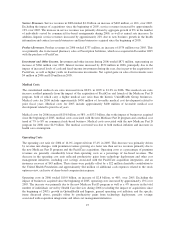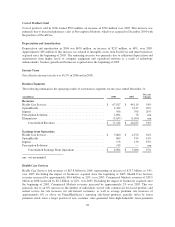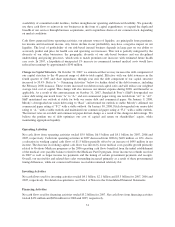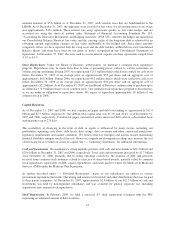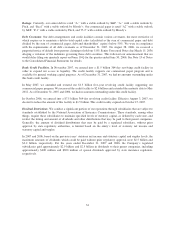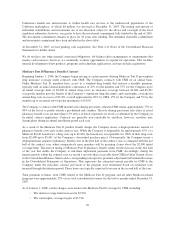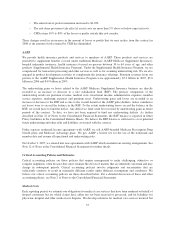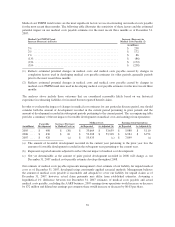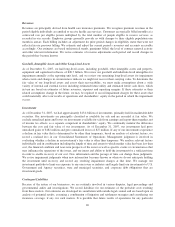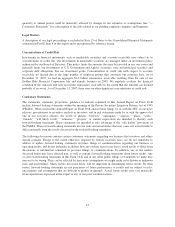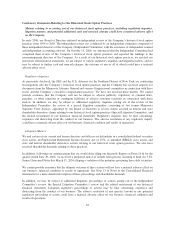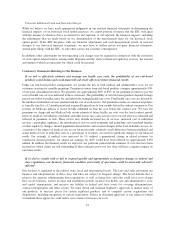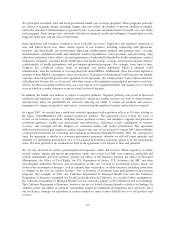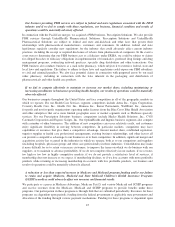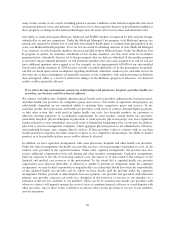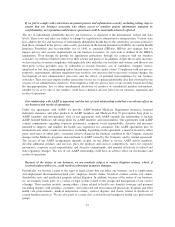United Healthcare 2007 Annual Report Download - page 39
Download and view the complete annual report
Please find page 39 of the 2007 United Healthcare annual report below. You can navigate through the pages in the report by either clicking on the pages listed below, or by using the keyword search tool below to find specific information within the annual report.• The annual out-of-pocket maximum increased to $4,050.
• The risk-share provisions take effect if actual costs are more than 5% above or below expected costs.
• CMS retains 50% to 80% of the losses or profits outside this risk corridor.
These changes result in an increase in the amount of losses or profits that we may realize from this contract in
2008 as the amount of risk retained by CMS has diminished.
AARP
We provide health insurance products and services to members of AARP. These products and services are
provided to supplement benefits covered under traditional Medicare (AARP Medicare Supplement Insurance),
hospital indemnity insurance, health insurance focused on persons between 50 to 64 years of age, and other
products (Supplemental Health Insurance Program). Under the Supplemental Health Insurance Program, we are
compensated for transaction processing and other services as well as for assuming underwriting risk. We are also
engaged in product development activities to complement the insurance offerings. Premium revenues from our
portion of the AARP Supplemental Health Insurance Program were approximately $5.3 billion in 2007, $5.0
billion in 2006 and $4.9 billion in 2005.
The underwriting gains or losses related to the AARP Medicare Supplement Insurance business are directly
recorded as an increase or decrease to a rate stabilization fund (RSF). The primary components of the
underwriting results are premium revenue, medical costs, investment income, administrative expenses, member
service expenses, marketing expenses and premium taxes. Underwriting gains and losses are recorded as an
increase or decrease to the RSF and accrue to the overall benefit of the AARP policyholders, unless cumulative
net losses were to exceed the balance in the RSF. To the extent underwriting losses exceed the balance in the
RSF, we would have to fund the deficit. Any deficit we fund could be recovered by underwriting gains in future
periods of the contract. To date, we have not been required to fund any underwriting deficits. As further
described in Note 12 of Notes to the Consolidated Financial Statements, the RSF balance is reported in Other
Policy Liabilities in the Consolidated Balance Sheets. We believe the RSF balance is sufficient to cover potential
future underwriting and other risks and liabilities associated with the contract.
Under separate trademark license agreements with AARP, we sell AARP-branded Medicare Prescription Drug
benefit plans and Medicare Advantage plans. We pay AARP a license fee for the use of the trademark and
member data and assume all operational and underwriting risks.
On October 3, 2007, we entered into new agreements with AARP which amended our existing arrangements. See
Note 12 of Notes to the Consolidated Financial Statements for further details.
Critical Accounting Policies and Estimates
Critical accounting policies are those policies that require management to make challenging, subjective or
complex judgments, often because they must estimate the effects of matters that are inherently uncertain and may
change in subsequent periods. Critical accounting policies involve judgments and uncertainties that are
sufficiently sensitive to result in materially different results under different assumptions and conditions. We
believe our critical accounting policies are those described below. For a detailed discussion of these and other
accounting policies, see Note 2 of Notes to the Consolidated Financial Statements.
Medical Costs
Each reporting period, we estimate our obligations for medical care services that have been rendered on behalf of
insured consumers but for which claims have either not yet been received or processed, and for liabilities for
physician, hospital and other medical cost disputes. We develop estimates for medical care services incurred but
37


